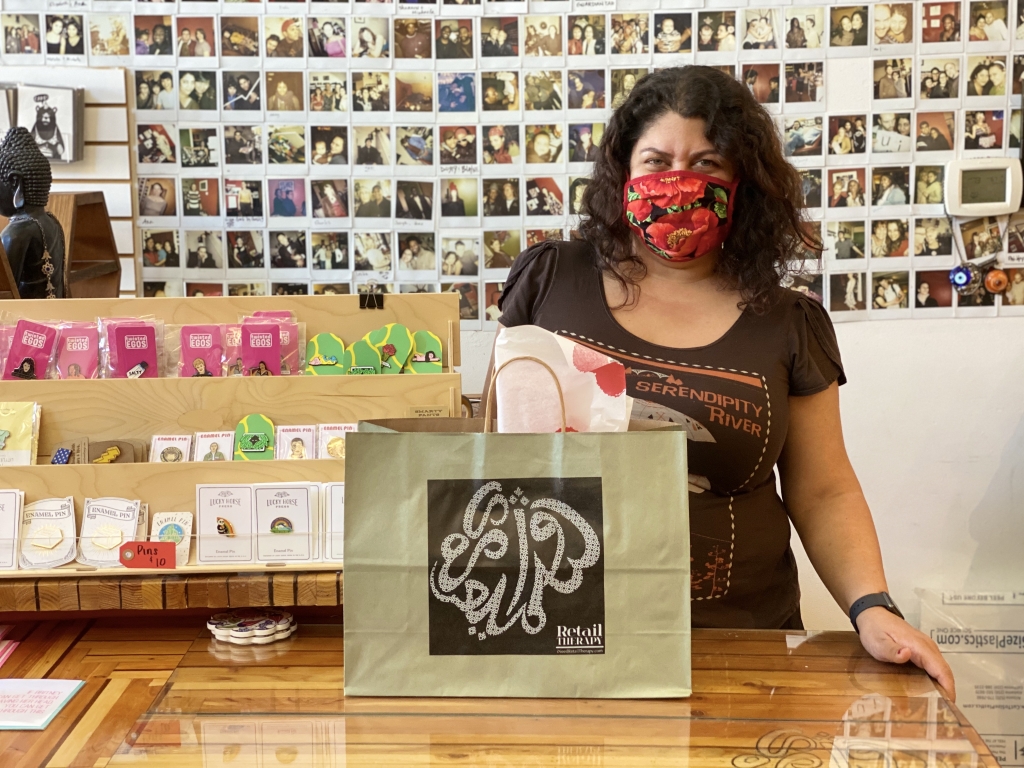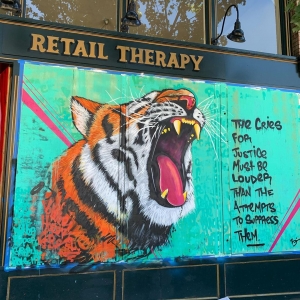
Amid the aftermath of September 11, 2001, Wazhma Samizay booked an international trip with her long-accumulated vacation hours. Unbeknownst to her, that vacation would alter the course of her life forever.
Recalling her visits to Spain, Portugal, and Morocco, she said that she learned firsthand how American fear was impacting people around the world. When she met people, they would ask her, “Wait, why don’t Americans come here anymore? Why are they so scared of us? Why do they hate us?”
As these iterative questions unfurled, she settled into a key realization.
“Most of the world thinks the same things about ‘other people,’” Samizay said. “There’s this gap, and if people had the opportunity to see these other parts of each other that are just human and see humanity in one another, it makes such a huge difference.”
She returned to the United States with a thrilling new purpose. In an effort to spread a vision of understanding and humanity, Samizay would open her own unique business, embarking on a journey that would continue for the next two decades. These were the early beginnings of Capitol Hill’s beloved store, Retail Therapy.
“A lot of my friends were taking bets that it wouldn’t last more than six months, and it was a genuine joke,” she laughed, recalling the store’s conception.
When Retail Therapy opened its doors in 2003, it functioned partly as a gallery and partly as a retail shop. According to Samizay, letting both the art and the retail goods support each other was a truly unique concept at the time. The gallery component had been inspired by her trip to Portugal.
“In Portugal, I was seeing a mix of art and independent artists, and at the time there really wasn’t anything like that here,” Samizay said. “It was also a time period [in the U.S.] where I felt like artists had so few opportunities to show their work. There was so much fear about the politics around 9/11. People who really wanted to do political work who were doing anti-war activism weren’t allowed to show in the galleries that they had been working in before.”
As the store now celebrates its 17th year, Samizay says she’s really taken an adaptive approach to her vision. She says the store ought to evolve, just as she does. The store is stocked with whatever is speaking to her at the moment, which she says is always changing. Ultimately, she’s perpetually on the hunt for high-quality items that are “art-driven, ethically-made, and beautiful.” Currently, her curation includes greeting cards, clothes, candles, and beautiful cloth masks.
When she’s searching for new merchandise, Samizay says that she keeps everyone she loves in her back pocket. She wants to cater to a wide variety of personalities and bodies, and the goods at her store wholly reflect that. Not to mention, customers often get a laugh out of her cheekier, kitschier picks.
The “feel good” store also continues to reflect its commitment to the intersections of art and activism. Recently, the store has featured artists including Seattle photographer Nate Gowdy and acclaimed painter Sabella “The Monarq.” Sabella’s featured painting series was dubbed a “love letter to Black women,” and Samizay admitted that it was so beautiful, she could imagine it being a permanent fixture in her store.
“I don’t want to do things just to get reactions, I want to do things because it actually has meaning,” Samizay said about the art shows at Retail Therapy. “We’ve had so many amazing shows that really push the edge of politics and from the beginning, my friends were like, ‘Are you crazy? You don’t mix business and politics ever.’ … I may not have made as much money, but I feel proud of the work we’ve shown and the way we’ve engaged in the neighborhood.”
If you walk by Retail Therapy today, you’ll see that the boarded windows are adorned with a giant mural of a roaring tiger by local artist B LINE DOT with a quote that reads, “The cries for justice must be louder than the attempts to suppress them.”

This installation reflects one of many ways that Retail Therapy is adapting to the needs of the neighborhood, which Samizay says has always been her focus.
“It just keeps changing with me and with my community, and that might be part of what’s kept us alive,” Samizay said. “I’ve never been stuck in having it just one way. I constantly ask, ‘Okay, what does my community want from me? What am I here to provide?’”
More than ever, that delicate sentiment is the driving force behind her day-to-day business plan. In response to the COVID-19 pandemic, she’s been considering the most responsible ways to move forward as a business owner.
“A $5 card is certainly not worth someone’s life,” she said. “Those are the questions we have to ask ourselves. Why are we doing this, what is the real intent?”
In an effort to keep all parties safe, Retail Therapy has transitioned to lean on their online store and a new in-person appointment system. The appointment system she says has been refreshing, because the 1-1 shopping experience feels more intimate and intentional. The online model, however, was never her goal.
“In regard to pivoting to an online platform, a lot of us never intended to sell online,” she said. “I never went into the business just to sell things.”
Above all else, she says, Retail Therapy is meant to be a joyful community experience.
“The real thread in it all is I want things in my space to ultimately make people feel good,” Samizay said. “I can watch people literally laugh out loud in my store and there’s huge satisfaction in that… It’s not just that I want people to buy things from me, I want them to go and have this exquisite memory and experience of that thing and use it. I don’t want it to just be this disposable piece in their life.”
As Samizay continues to navigate what it means to be a community-driven space in the age of social distancing, she says that her mood changes day-by-day.
“We’re constantly dealing with all of the things that all small businesses are contending with,” she said. “I feel really hopeful for a day and the next day it’s something totally different.”
In spite of the pandemic, customers continue to celebrate Retail Therapy for its uniqueness, and Samizay theorizes that the store’s differences have helped keep the business alive. Amid many businesses that Samizay says have started to look hazily uniform, she’s always offering a new perspective. Or, as she frames it, a burst of full color amid Seattle’s signature grey.
Other “colorful” and unique businesses where Samizay likes to #SpendLikeItMatters include Capitol Hill’s Sugar Pill, Café Pettirosso, and Ghost Gallery.
“I love my neighborhood and the people who work in this region. I feel like we are in some ways a small little family and it’s constantly evolving,” she said.
As far as what’s next for the future of Retail Therapy, Samizay likes to keep an open mind. Her philosophy, for the store and for her life, revolves around being open to what life brings.
“My hope is that I get to do what I love for as long as I can,” Samizay said. “I don’t have a fixed idea of how long that gets to be, and that’s really been the case from the beginning. I don’t have an attachment in the sense that it can only be one way. There may be a time where it’s not needed anymore or something new needs to emerge from the space, so I’m open to that, too. But in the meantime, I want to keep pushing it to expand and be well-received.”
Shop Retail Therapy online or make an appointment to browse the store here.
Thanks for all that you do to #SpendLikeItMatters! Discover awesome brick + mortar small businesses in your community, suggest your favorites, and be sure that you’re following us on social media (Instagram, Facebook, Twitter).
Intentionalist is your local guide to small businesses and the diverse people behind them. We believe that where you spend your money matters, and we’re sure glad you do too! Whether you identify as a localist, activist, or just a good neighbor, we make it easy for you to connect with, learn about, and support small businesses in your community through everyday decisions about where you eat, drink, and shop.